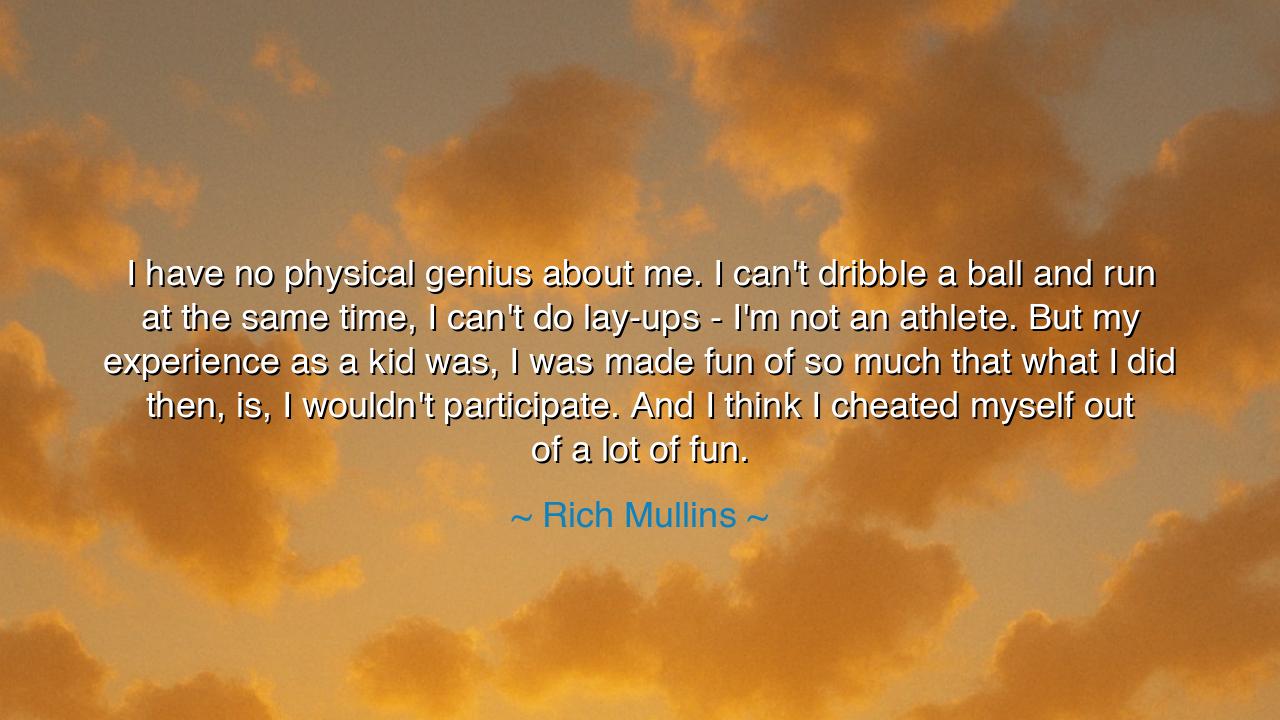
I have no physical genius about me. I can't dribble a ball and
I have no physical genius about me. I can't dribble a ball and run at the same time, I can't do lay-ups - I'm not an athlete. But my experience as a kid was, I was made fun of so much that what I did then, is, I wouldn't participate. And I think I cheated myself out of a lot of fun.






“I have no physical genius about me. I can't dribble a ball and run at the same time, I can't do lay-ups — I'm not an athlete. But my experience as a kid was, I was made fun of so much that what I did then, is, I wouldn't participate. And I think I cheated myself out of a lot of fun.” Thus spoke Rich Mullins, the troubadour of faith, whose voice carried not only the beauty of music but the ache of self-understanding. His words are humble, yet they carry the quiet weight of confession and wisdom — a reflection on the wounds of youth, the pain of rejection, and the loss that comes when fear silences joy. It is not a lament of bitterness, but a gentle, sorrowful truth: that when we let others define our worth, we deny ourselves the fullness of life.
The origin of this quote lies in the heart of Mullins himself — a man who, though not built for sport or spectacle, was rich in the music of the soul. He spoke these words not as complaint, but as a lesson carved from experience. As a child, mocked for his lack of athletic skill, he withdrew from play. And though the retreat spared him humiliation, it also robbed him of connection, laughter, and freedom. In adulthood, he saw clearly what the boy could not: that by avoiding failure, he had also avoided joy. His “cheating himself” was not through weakness, but through protection — the kind of armor that, though it keeps us safe, also keeps us separate.
In these words, Mullins echoes an ancient truth. The wise have long known that fear of shame is one of life’s most subtle prisons. Socrates, condemned by his city, taught that it is better to suffer wrong than to do wrong; for wrongdoing wounds the soul more deeply than pain. Likewise, Mullins reveals a parallel truth: it is better to risk embarrassment and participate in life than to guard dignity and lose delight. To be made fun of is a fleeting pain; but to withdraw from life’s dance — that is a sorrow that lingers for years.
Consider the story of Vincent van Gogh, a man whose art was ridiculed, whose soul was misunderstood. The world mocked his vision, calling it strange, distorted, childlike. And yet, he continued to paint — not for fame, but for the joy of creation. In this, he lived the courage that young Rich Mullins could not yet find. He participated fully in what his heart was made for, even when the world scorned him. His life reminds us that beauty is not in being admired, but in being true to oneself. For those who allow ridicule to silence their spirit, the greatest tragedy is not the laughter of others — it is the silence within.
What Mullins mourned, then, was not his lack of talent, but his loss of innocence — that bright, fearless joy of childhood that leaps before it looks, that plays for the sake of playing. The boy who was mocked for clumsiness became the man who understood the deeper tragedy of self-exclusion. By stepping away from the field, he had also stepped away from community, from the shared laughter of imperfection, from the small, sacred freedom of simply being alive among others. His words are an elegy for every soul that has ever withdrawn out of fear — the musician who hides their song, the dreamer who stays silent, the child who decides it is safer not to try.
Yet his confession is not despair, but redemption through understanding. For in recognizing his loss, Mullins teaches us to reclaim what we have cast away. He reminds us that joy is not the reward of skill, but the gift of participation. The court, the stage, the life itself — these are not places for perfection, but for presence. To risk failure is to open the door to laughter, friendship, discovery, and growth. The true genius of living is not in how well we perform, but in how bravely we show up.
So let the lesson be heard: do not let mockery or failure shrink your spirit. The world’s laughter cannot harm a soul that loves its own becoming. Participate, even when you are unsure. Sing, even off-key. Dance, even if you stumble. Try, even when others doubt. For the measure of life is not in mastery, but in presence — in daring to live unguarded, unashamed, unafraid.
And when you look back upon your days, let it not be with regret for the things you did not dare to do. Let it be said that you joined the game, that you took part in the great laughter of creation. As Rich Mullins learned too late, the joy of life belongs not to the perfect, but to the willing. Therefore, live boldly, love deeply, and play — for the divine spirit within you was never meant to watch from the sidelines.






AAdministratorAdministrator
Welcome, honored guests. Please leave a comment, we will respond soon